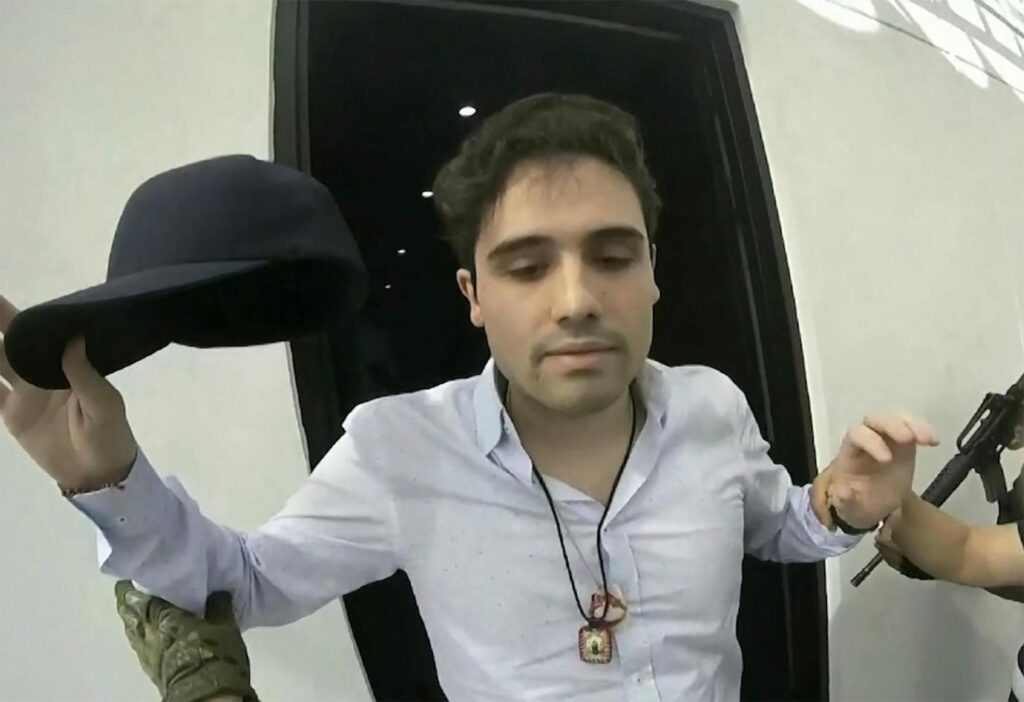CHICAGO (AP) — The son of infamous Mexican drug lord Joaquin “El Chapo” Guzman is set to plead guilty to drug trafficking charges in the United States. According to court documents filed on Tuesday, Ovidio Guzman Lopez, who has been accused of running a faction of the Sinaloa cartel, will change his plea in a federal court in Chicago on July 9.
The announcement comes as part of a plea deal negotiated with prosecutors, marking a significant development in the ongoing battle against international drug trafficking. This move represents a pivotal moment in the U.S. government’s efforts to dismantle the operations of the notorious Sinaloa cartel, which has been a major player in the global drug trade.
The Rise of the Chapitos
Ovidio Guzman Lopez, alongside his brother Joaquin Guzman Lopez, allegedly led a faction of the cartel known as the “Chapitos,” or little Chapos. This group is accused of exporting large quantities of fentanyl to the United States, contributing to the ongoing opioid crisis. The brothers inherited their roles from their father, Joaquin “El Chapo” Guzman, who led the Sinaloa cartel for over two decades, smuggling vast amounts of cocaine and other narcotics into the U.S.
Ovidio Guzman Lopez was apprehended in Mexico in 2023 and subsequently extradited to the United States, where he faced charges including money laundering, drug trafficking, and firearm offenses. Initially pleading not guilty, his decision to change his plea follows revelations of a possible deal during an October hearing.
Legal Proceedings and Implications
Ovidio Guzman Lopez’s decision to plead guilty is significant, as he becomes the first of the Guzman brothers to enter a plea agreement. His brother, Joaquin Guzman Lopez, remains in U.S. custody after being arrested alongside Ismael “El Mayo” Zambada, another high-ranking Sinaloa leader, in Texas. Both have pleaded not guilty to charges of money laundering, drug dealing, and conspiracy to distribute drugs.
Their arrests have not been without consequence. The capture of these cartel leaders sparked a wave of violence in Mexico’s northern state of Sinaloa, where rival factions of the cartel clashed in the power vacuum left by their detention.
“The capture of the Guzman brothers is a crucial step in curbing the influence of the Sinaloa cartel,” said a law enforcement official familiar with the case. “However, the resulting violence underscores the ongoing challenges in dismantling such entrenched criminal organizations.”
Historical Context and Expert Analysis
The Sinaloa cartel, once led by “El Chapo,” has long been a dominant force in the drug trade, with operations stretching across continents. The cartel’s influence has been felt deeply in both Mexico and the United States, with its leaders often evading capture through a combination of violence, corruption, and sophisticated smuggling tactics.
Experts note that while high-profile arrests like those of the Guzman brothers are significant, they often lead to internal power struggles that can exacerbate violence. “The arrest of key figures can create a leadership vacuum, leading to turf wars as remaining members vie for control,” explained Dr. Ana Maria Salazar, a security analyst specializing in Latin American drug cartels.
By the Numbers: The opioid crisis in the U.S. claims over 70,000 lives annually, with fentanyl being a major contributor.
Looking Ahead
The plea deal with Ovidio Guzman Lopez could have far-reaching implications for the ongoing fight against drug trafficking. It may provide U.S. authorities with valuable intelligence on the inner workings of the Sinaloa cartel, potentially leading to further arrests and disruptions of their operations.
As the legal proceedings continue, attention will remain focused on how the U.S. justice system handles such high-profile cases and the impact on international efforts to combat drug trafficking. The outcome of these trials could set precedents for future cases involving transnational criminal organizations.
Meanwhile, the violence in Mexico serves as a stark reminder of the challenges ahead. As authorities work to dismantle these powerful cartels, the path to peace and stability remains fraught with obstacles.
